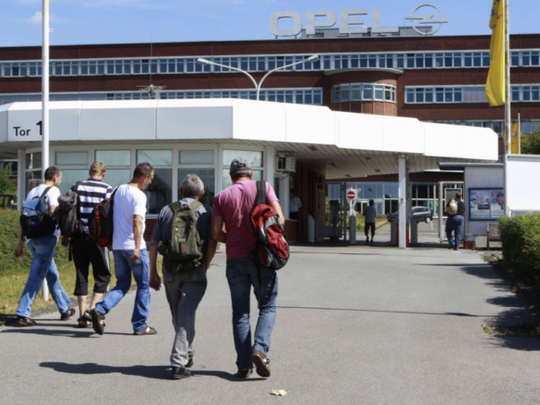
Frankfurt: General Motors Co’s ailing German unit, Opel, will cut the hours of several thousand workers at two of its four plants in response to a drop in demand for cars in Europe.
Opel agreed with labour representatives to halt production for a total of 20 days at its main factory in Ruesselsheim and its component plant in Kaiserslautern between September and the end of the year, it said on Thursday, confirming an earlier report. GM lost $747 million (Dh2.7 billion) on its European operations, which include Vauxhall in Britain, last year as a weak economy hit car sales in the region, forcing automakers to confront high fixed costs tied to running about 10 more car plants than needed in Europe, where demand for new vehicles is sliding.
“The European automobile market is declining dramatically,” Opel’s head of personnel, Holger Kimmes, said in a statement, adding that flexible working hours were no longer sufficient to offset a decline in use of the Ruesselsheim factory.
The move could save GM about $50 million if half the workers at the two plants take the downtime, Barclays Capital analyst Brian Johnson said in a research note.
“While not a game changer, the savings gives us additional confidence that we will not need to adjust second half estimates,” Johnson wrote, adding that GM could benefit more if it extends the program into 2013.
“Nevertheless, the program is only a stopgap measure, and does not remove the need to take out 1-2 plants quickly, as opposed to the 2016 timetable for one plant (Bochum),” he said.
The GM division is squeezed between sagging consumer demand in Europe’s indebted economies and growing competition from Asian volume-car makers. Opel lost an average 938 euros ($1,200) before interest and tax per vehicle sold in the first half of the year, a survey of the CAR Centre of Automotive Research at the University of Duisburg-Essen showed.
Opel’s first-half European deliveries plunged 15 percent to 457,630 vehicles.
Yet shortening staff hours may grant only a short-term reprieve to Opel, doing nothing to alleviate the carmaker’s structural problems of unused factory space, said Frankfurt-based Commerzbank analyst Sascha Gommel.
“Closing down plants for a few days isn’t going to help Opel with its most pressing problem of overcapacity,” Gommel said.
It has 13,800 workers in Ruesselsheim, about half of whom will be affected by the agreement, the company said. It is cutting hours of employees on the production lines as well as in administration.
The Kaiserslautern factory has a workforce of 2,500.
Now that it has the approval of the works council and labour union IG Metall for the plan, Opel can apply for subsidies under the German government’s short-work programme, called “Kurzarbeit.”
The scheme was used by many struggling companies in the 2008-2009 recession, allowing them to preserve jobs by cutting employees’ hours when plant usage was low and having the government compensate workers for part of their lost wages.
US carmaker Ford Motor Co, which expects to lose more than 1 billion euros ($1.23 billion) in European operations this year, cut back production at its Cologne-based main European factory in May and June, affecting 4,000 workers.












